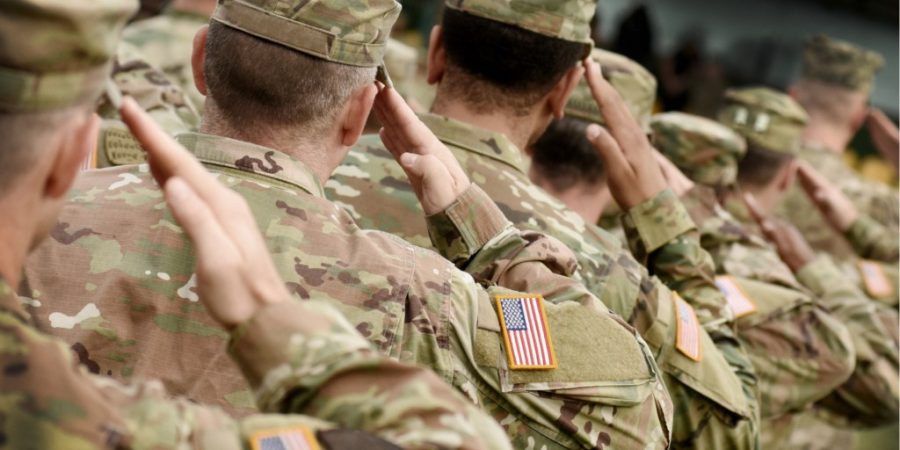
Most people don’t need evidence that substance abuse and PTSD in veterans are linked. They can see it with their own eyes: in friends, family members, and squad mates who turn to alcohol or drugs after a traumatic event in the military. But science can help us to learn both how and why these mental health disorders are connected, leading to improved treatment outcomes for substance abuse and PTSD in veterans.
Table of Contents
Prevalence of PTSD Among Veterans

PTSD is particularly prevalent among military populations. In fact, lifetime rates of PTSD are as high as 13.2% for female veterans and 6.2% for male veterans, and each group has roughly twice the rate of civilian populations.
Several factors contribute to why military personnel deal with PTSD at such high rates. Combat exposure, military sexual trauma, and moral injury are all leading factors. In addition, many veterans who have PTSD avoid looking at treatment options, which may be a result of a military stigma against mental health care.
In addition, substance abuse and PTSD in veterans frequently occur together. Strikingly, 63% of veterans who have a substance use disorder have co-occurring PTSD. This percentage increases to 76% if the veteran has a problem with both drugs and alcohol. But for many veterans with addiction issues, they may not even recognize their own PTSD symptoms.
Signs of PTSD
After a traumatic event, it is completely normal for people to feel anxious, stressed, and withdrawn. When these symptoms persist for months or years after the event, it can be diagnosed as post-traumatic stress disorder. Common signs of PTSD include:
- Repeated, intrusive thoughts about the event
- Frequent nightmares
- Anxiety around certain things, people, or situations
- Persistent negative mood
- Avoiding things that remind them of the event
- Irritability and outbursts
Essentially, post-traumatic stress disorder is characterized by extended stress long after the danger is over. Your body and mind are left on high alert, particularly when you are reminded of a traumatic event. And this constant restlessness and anxiety can easily contribute to a substance abuse issue.
How PTSD Leads to Substance Use Disorders
The symptoms of PTSD cause intense emotional and mental distress. Learning to deal with these problems is different for everyone, but many people find that alcohol or drugs bring some relief. Unfortunately, this relief is often short-lived.
Researchers have several names for this pattern: drinking to cope, self-medication, and hazardous drinking or drug use are just a few. Yet the science paints a clear picture: Drinking or using drugs to deal with stress is directly linked to addiction. So why is this the case?
Given enough time, anyone using alcohol or drugs will begin to experience tolerance. Tolerance is your brain and body adjusts to counteract the effects of toxic substances, dampening the effectiveness of drugs and alcohol. As a result, over time you need to use and more more of the substance to achieve the desired effect.
And while your usage increases, the ingested chemicals alter your brain’s reward pathways. It makes it harder to engage in activities outside of drug or alcohol use, creates powerful cravings for the drug, and makes it difficult to stop on your own.
When not under the influence, people may experience:
- Increased anxiety and paranoia
- Restlessness
- Sleep difficulties
- Depression
- Nausea and vomiting
These are the withdrawal symptoms of several drugs, and they can compound the effects of PTSD symptoms. These symptoms make it harder to quit drugs or alcohol on your own, especially with a co-occurring mental health issue.
This is the path to substance abuse, and PTSD in veterans often worsens as a result. Without seeking treatment, many veterans with PTSD will suddenly find themselves fighting two mental health disorders rather than one.
Treating Veterans with Substance Use Disorders and PTSD

Part of the problem with substance abuse and PTSD in veterans is that they feed off each other in a negative spiral. PTSD symptoms lead to substance use, which leads to worsening PTSD symptoms, which leads to further substance use, and so on. To truly break free from addiction and overcome PTSD, both problems must be treated concurrently.
That’s exactly the approach taken at Heroes’ Mile. Our veterans-only rehab places a heavy emphasis on trauma treatment for veterans suffering from PTSD, while also incorporating the best evidence-based practices for addiction treatment.
What Specific PTSD Treatments are Available?
Treating PTSD takes compassion, effort, and understanding. It also requires targeted services that have been proven to help people overcome their symptoms and regain their quality of life. At Heroes’ Mile, we have several targeted PTSD treatments available.
First, we have specific counseling services that address PTSD and other invisible wounds of war. These individual therapy sessions can help illuminate the root cause of your trouble, and help your counselor devise a treatment plan to help you achieve recovery.
We also offer specialized treatment for PTSD in the form of eye movement desensitization and reprocessing (EMDR) therapy. This novel treatment has you meet with an individual therapist who will use special instruments to control your gaze during therapy. By bringing your visual awareness side to side, called bilateral stimulation, traumatic experiences can become “unstuck” in the brain, and you can experience significant relief. This novel treatment may sound simplistic at first—but extensive research has proven its effectiveness in helping people overcome their traumas.
And across all treatments, you can rest assured that all of your other treatments at Heroes’ Mile are trauma-informed. This means that our counselors are acutely aware of the effects that trauma can have and take measures to ensure you don’t get retraumatized in the healing process.
What Specific Addiction Treatments are Available?
Heroes’ Mile subscribes to the 12-step philosophy of addiction recovery. We use the 12 steps because they work and have helped countless veterans achieve recovery. During treatment, you will be introduced to the 12 step program, meet regularly with a counselor to discuss your progress, and get connected with resources that can help you long after you leave our facility.
In addition, we prioritize individual therapy and group therapy to help people overcome their substance use disorders. And since we are a veterans-only program, these groups and sessions are held with veterans’ issues closely in mind.
And of course, we offer full medical detox services for veterans who need help breaking through the initial phase of substance use withdrawal. This program can help you to manage the uncomfortable, and often life-threatening, effects of trying to suddenly stop using alcohol or drugs.
Residential Rehab for Veterans
At the core of our philosophy is that veterans can help each other to recover better than anyone else can. To that end, we only accept veterans in any of our programs, and our staff is primarily made up of veterans. This means that you will be surrounded by people who can truly understand your struggle and help you to overcome.
Residential rehab takes a comprehensive approach to treating substance abuse and PTSD in veterans, including:
- Veteran-focused individual therapy
- 12-Step programming
- Group therapy
- Eye movement desensitization and reprocessing (EMDR) therapy
- Cognitive behavioral therapy
- Family members counseling services
- Nutritional assessments and food planning
- Art therapy
- Job training
And much more. As no two veterans are alike, we make sure to individualize treatment options for each of our residents.
When you’re ready to start the path to recovery, reach out to our team by calling 888-838-6692 or filling out our confidential online form. Substance abuse and PSTD in veterans can seem insurmountable, but when veterans help each other, recovery is absolutely possible. Don’t delay treating your mental health any longer: Get started with your recovery today.
The post The Science Linking Substance Abuse and PTSD in Veterans appeared first on Heroes’ Mile Veterans Recovery Center.
Source
Original Author: Heroes’ Mile

